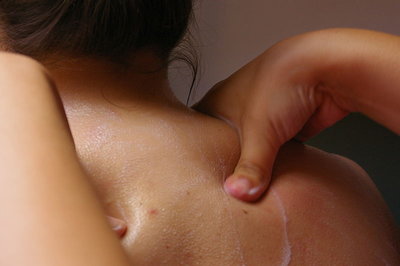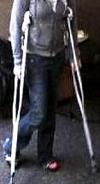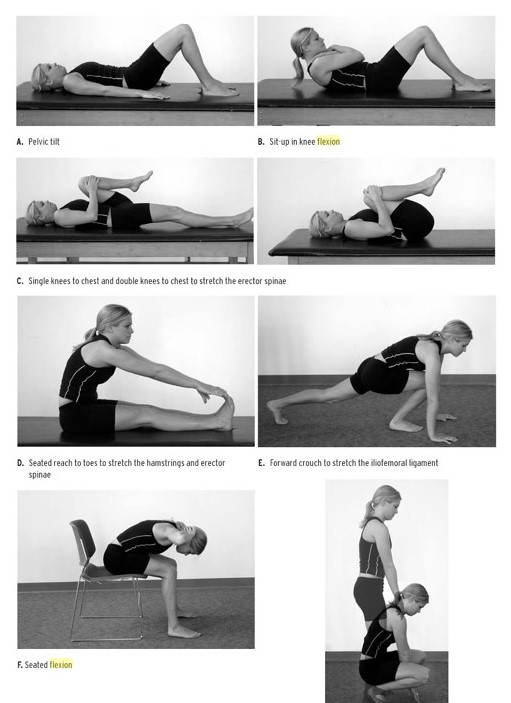Enhance your health with free online physiotherapy exercise lessons and videos about various disease and health condition
Pinched Nerve In Shoulder
Typically, pinched nerve in shoulder occurs when too much pressure is applied to the shoulder nerve by the surrounding tissue, such as cartilage, tendons, bones and muscles. Symptoms include muscle weakness, numbness, pain and a tingling sensation that radiates along the shoulders and into the neck or spine. While pinched nerves may occur anywhere in the body, they most commonly affect the neck, shoulder and lower back.
A pinched nerve can cause debilitating pain. It can seemingly come from out of no where, waking you up from a night's sleep, or it can be the result of an accident or sports injury. In many cases, a pinched nerve results in severe pain and disability in the shoulder and upper arm. After treating the pain with moist heat, consult your physician. Exercise therapy is one of the first courses of treatment.
What is a pinched nerve?
A pinched nerve is a term that is quite common to hear, but most of us don’t really know what it means. A pinched nerve in the shoulder is a complaint that you will hear often, a very painful one at that, however not totally correct. Nerve compressions can be caused by muscles, tendons, bones and cartilage that surround the nerve and branches of it.
Often people can get a pinched nerve in shoulder region when they have tight muscles, however, generally the nerve is not actually being pinched by a muscle in the shoulder. Typically it comes from the disc area in your neck. It usually happens around C6 and C7. This is typically where problems can occur and result in symptoms like a pinched nerve in the shoulder. The nerves that run through C6 and C7 travel down through your shoulder blades, and can cause chronic pain and muscles spasms. A pinched nerve in the shoulder that originates in the neck is not always the actual diagnosis, but it is something you need to look out for, as it is quite typically disguised as a shoulder problem.
The neck is a complex place when it comes to nerves, and neck pain can stem from all manner of things, including a pinched nerve in shoulder. Nerves can become trapped in the shoulder itself, due to the cramped conditions in an area called the brachial plexus. The brachial plexus has a number of cervical nerves travelling through it to the upper limbs. These nerves exit the spinal column and then branch off and rejoin in various patterns to innervate the musculature of the chest, shoulder, arms, and hands. Disc herniation in the cervical spine can also cause pinched nerves leading to shoulder and neck pain.
Causes of pinched nerve in shoulder
Usually, people who work in construction, factories, delivering packages, and others are the ones who are having pinch nerve in shoulder. People working in constructions carry heavy loads like hollow blocks, sand, rocks, wood are the once having pinch nerve in their shoulder. Same for factory workers and delivery men carry heavy loads of their products. They have been putting pressure on their bodies, especially their shoulders. Other causes of pinch nerve are due to swelling of some parts of your body because of pregnancy, arthritis, diabetes, family history and many more. So even though we’re careful, we can still have pinch nerves.
The problem may also stem from poor posture that causes tissue surrounding the nerve to "push" into the nerve. In obese people, the sheer mass of excessive tissue surrounding a nerve can be the cause. The trouble could be rooted in another medical problem, such as a herniated spinal disc.
If you have an extra cervical rib this can put more stress on an already cramped area, and any minor trauma to the shoulder can result in neck pain, arm pain, and even coldness and weakness in the fingers, depending on which nerves have been impacted. Sometimes a fairly innocuous repetitive motion which taps on the front of the shoulder can lead to inflammation in the area and cause a pinched nerve in shoulder.
Pinched Nerve In Shoulder Symptoms
Pain: Pain is a common symptom of a pinched nerve in shoulder. It might be sharp or burning, it could cover the whole shoulder area, or a specific spot. This depends on the location of the nerve. If it is close to the spinal cord and originating from the neck then neck movements may agitate it as well.
Numbing: Numbness or tingling can occur due to a pinched nerve in shoulder. You might get a feeling that your shoulder is dead, or when you touch it you don’t feel as much, there is less sensation. Pins and needles is another common complaint. It may occur any place between your hand to your neck and depends on where the nerve is being compressed.
Weakness: Since the nerve are what activates muscles, if one is being compressed, the signal to your muscle will be weak. You will therefore experience muscle weakness as a result of a pinched nerve in shoulder. You may experience it when you are reaching above your head to try to grab something, and occurs in different parts of the arm depending on the nerve location.
Muscle Spasms: Muscles spasms and twitching can occur as a result of a pinched nerve in shoulder, especially one that is originating in the neck area.
- C5 - The main result of a pinched C5 nerve root is shoulder pain, weakness in the deltoid muscles, along with the possibility of a numb sensation in the shoulder area.
- C6 - The main result of a pinched C6 nerve is pain radiating down your arm and into your thumb. Other less common symptoms include weakness in the biceps and wrist muscles.
- C7 - The main result of a pinched C7 nerve is pain and numbness radiating down the arm and into the middle finger.
- C8 - The main result of a pinched C8 nerve is a numb sensation or pain felt in the outside of the hand.
Diagnosis Of A Pinched Nerve In Shoulder
Read more about Pinched nerve in shoulder on Web MD
In the majority of cases a pinched nerve in the neck happens at C6 or C7, and your physician will isolate the problem by assessing your symptoms and then, most often, sending you for an X-Ray, MRI or CT scan. If the nerve at C5 is pinched, however, you are likely to develop shoulder pain, numbness, and weakness in the deltoids and bicep muscles. Pain can be both sharp and acute, or a dull aching pain in the neck or shoulder. Some patients may experience a widespread pain, whereas for others it is isolated to a smaller spot and can produce a burning sensation. Numbness, and a feeling of pins and needles in the shoulder can indicate a trapped nerve and lead to muscle weakness and, over time, muscle atrophy (wasting).
Treatment for Pinched Nerve In Shoulder

Stuff To Do At Home
1. Correct your shoulder and back posture. The way that you are sitting now can cause more compression of the nerves. If you are hunching forward, this can cut the blood flow to the nerve so it is best to keep your shoulders back. To correct your shoulder posture, you can buy a shoulder posture shoulder brace online or if you want immediately, go buy it for your pharmacist or any other health equipment shop.
2. Rest your arms and shoulder in a relax position. Put your arms on a pillow and try not to stretch your shoulder out. Moving your arms can stretch the nerve and therefore aggravate the condition.
3. Apply a heat pack onto your shoulders and neck. One of the reasons you have pain is because your shoulder muscles might be too tight and therefore compressing the underlying nerve. Heat can greatly relieve the muscular tension and therefore apply less pressure on the nerve.
4. Massage the neck and shoulder. Make sure that you don’t apply too much pressure. The massage should be light and gentle. Don’t try to massage yourself and get a health professional like a chiropractor, physical therapist or massage therapist to treat you.
5. Use anti-inflammatory drugs (NSAID – Non-Steriod Anti-inflammatory drugs). These can give you a bit of relief but be sure that you know the possible side effects are. They do not remove the cause of the pain.
6. Apply heat cream or herbs onto the affected area. Again, this doesn’t remove the cause of the problem but can give you plenty of relief.
After about 10 -12 days, you can start physiotherapy. It helps strengthen and stretch the muscles, relieve pain and pressure, alleviate stiffness and improve the range of motion. Also, the doctor may prescribe over the counter analgesics to allay pain quickly. Cases that do not respond to conservative treatment need surgery.
Useful Tips to overcome Pinched nerve in shoulder
There are many factors that contribute to pinch nerve in shoulder but they can be prevented to. Do not carry heavy loads using your back but use your legs to carry it. Obesity is also one cause because it increases the pressure on the nerves with the heavy weight in your body, so try to loose weight. Exercising regularly is a big help, try swimming, jogging or biking. Then let your body rest after a long work. One cause of pinch nerve is over working.
Try doing stretches; it can help after a long day of work. And lastly, always have proper posture. Stand up straight and sit down properly. Try to avoid slouching, keep your stomach in and chest out, and try to lessen the use of very high heeled shoes. These are some tips that can help in improving pinched nerve in shoulder. But take note that you should always ask your doctor about these especially when your pinch nerve is severe.
What Other Visitors Have Said
Click below to see contributions from other visitors to this page...
How to Avoid Arm Pain When Using Crutches 




I have to use crutches and sometimes a walker due to a broken foot/ankle with NWB for at least another month. I need info on relieving extreme pain in …
Elbow and Hand Pain 




For many years I (probably monthly)would experience a stiff neck with no ability to ease the pain. I would just wait it out and it would resolve within …
case discussion on pinched nerve in shoulder 




I had a DCR surgery on 7-6-2010. And today I have a pinched nerve in shoulder that is causing atrophy in the muscles on back of shoulder . The surgen …
Shoulder and neck pain 




I need some serious help. In September 2011 I underwent Carpel Tunnel surgery, whereby only my left arm was numbed. Since that time I have had severe …
cervical vertigo 




I have found that when I move my head backward towards my shoulders in a certain position that I become very dizzy and sometimes it is so bad the the …
Return from pinched nerve in shoulder to Home Page
Return from pinched nerve in shoulder to Orthopedic physical therapy
Recent Articles
|
Author's Pick
Rating: 4.4 Votes: 252 |






